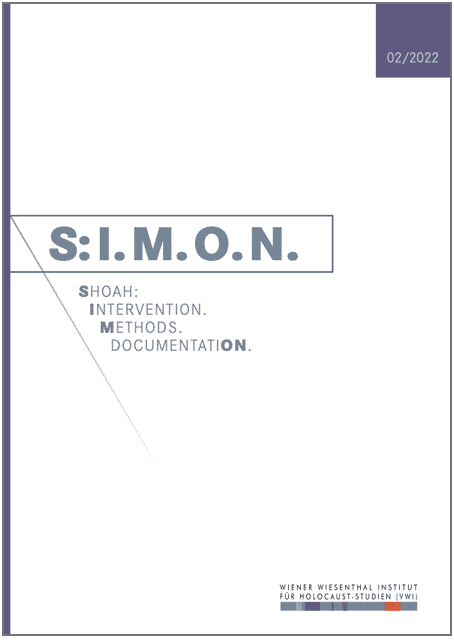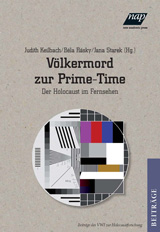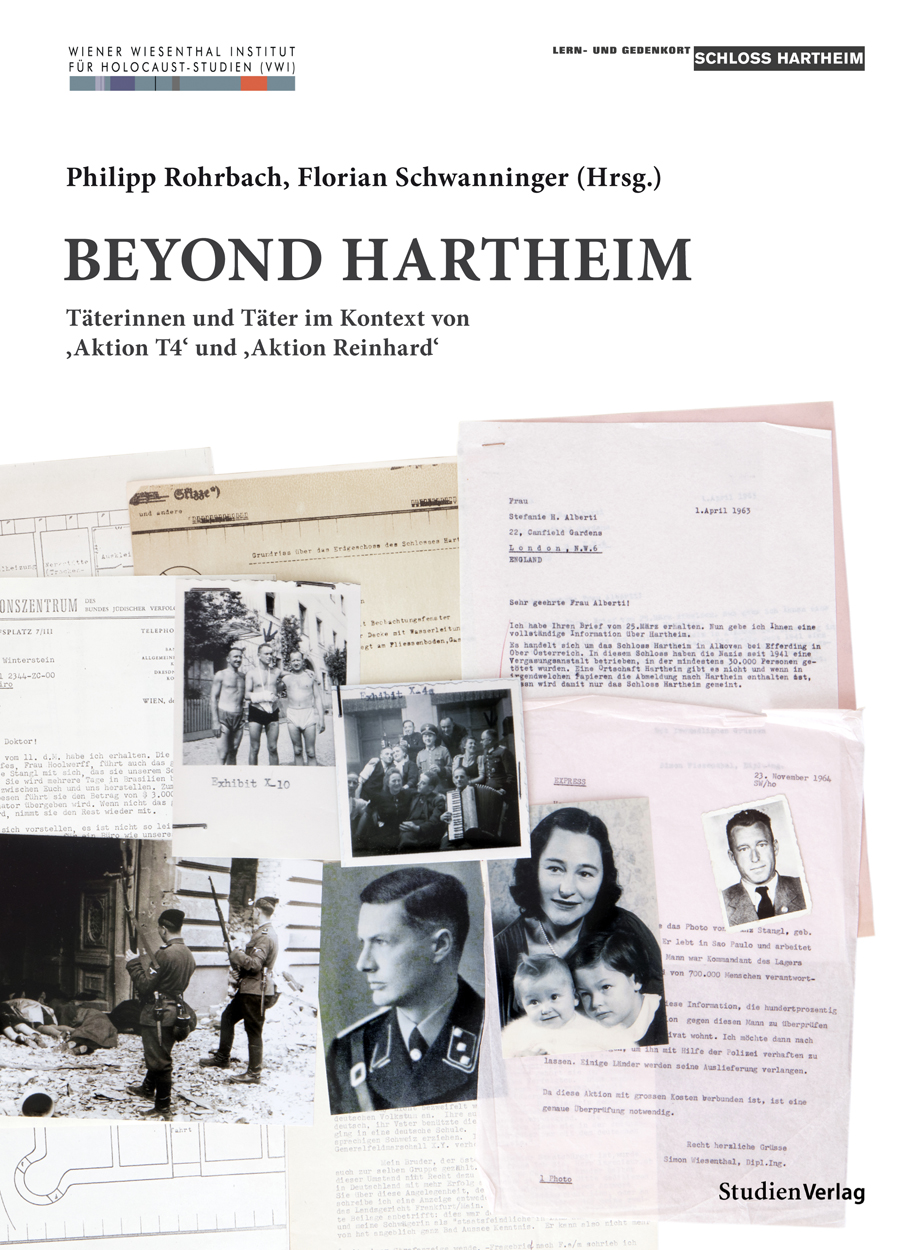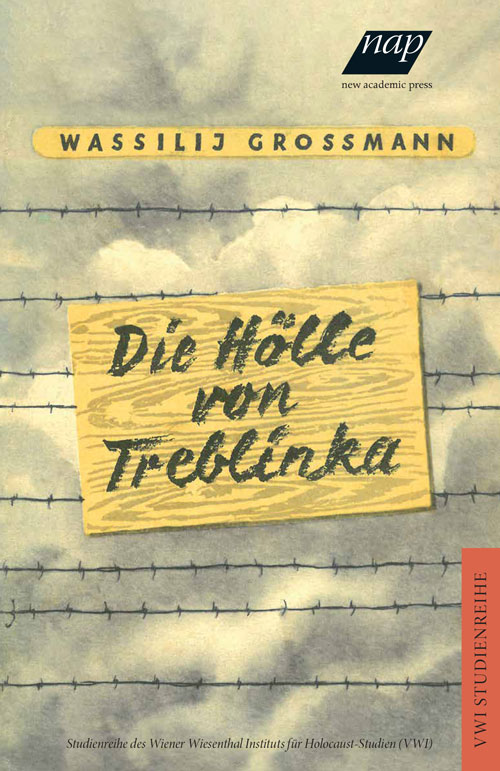News – Events – Calls
| 24. April 2024 19:00 BuchpräsentationIngeborg Bachmann, Marie Luise Kaschnitz, Hilde Domin, Nelly Sachs: Über Grenzen sprechend. Briefe. Piper/Suhrkamp, München, Berlin, Zürich 2023Ingeborg Bachmann stand mit zentralen Protagonistinnen der deutschsprachigen Literatur im Austausch, nun werden ihre Briefwechsel mit Marie Luise Kaschnitz, Hilde Domin und Nelly Sachs erstmals zugänglich gemacht. Die Briefe geben Einblick in die Lebensbedingungen, das literarische S...Weiterlesen... |
| 02. May 2024 18:30 Simon Wiesenthal LectureEdyta Gawron: Never Too Late to Remember, Never Too Late for Justice! Holocaust Research and Commemoration in Contemporary PolandIn 1994, Simon Wiesenthal received a doctorate honoris causa from the Jagiellonian University in Krakow for his lifelong quest for justice – half a century after he had been, for a short time, prisoner of the local Nazi Concentration Camp (KL) Plaszow. The 1990s were the decade when t...Weiterlesen... |
| 07. May 2024 00:00 - 04. June 2024 00:00 WorkshopDealing with Antisemitism in the Past and Present. Scientific Organisations and the State of Research in AustriaThis series of talks, presented by antisemitism experts from different organisations that research antisemitism using a variety of academic approaches, aims to provide a snapshot of historical evolutions, current events, prevalent perceptions and declared (and undeclared) attitudes. I...Weiterlesen... |
| 14. May 2024 08:45 - 16. May 2024 16:30 TagungQuantifying the Holocaust. Classifying, Counting, Modeling: What Contribution to Holocaust History? About the conference: https://quantiholocaust.sciencesconf.org/ Programme timed on the basis of 15-minute presentations + 15-minute discussions; short breaks and lunches Day 1 Tuesday, 14 May 2024Centre Malher (9 rue Malher 75004 Paris/amphi Dupuis) From 8.45 am: Welcome9.30 am...Weiterlesen... |
| 24. May 2024 18:00 InterventionLange Nacht der Forschung 20242024 öffnet das Wiener Wiesenthal Institut für Holocaust-Studien (VWI) in der Langen Nacht der Forschung wieder seine Tore und lädt Interessierte in seine Räumlichkeiten am Rabensteig 3 ein. Im Rahmen von Vorträgen, Podiumsdiskussionen und Präsentationen bieten VWI-Team und Gäste Einb...Weiterlesen... |
Lilia Tomchuk
Junior Fellow (02/2023 – 08/2023)
Shades Of Agency: Wahl, Überleben und Widerstand jüdischer Frauen während des Holocaust in Transnistrien
 This project explores the facets of Jewish women's actions in different contexts during the Holocaust in Transnistria: Several Jews, Rom:nja from Bessarabia and Bukovina as well as Ukrainian Jews from the local neighbourhood were deported to Transnistria between 1941 and 1944. In research, Transnistria is predominantly portrayed as a "dumping ground". But conditions in the region varied greatly. Compared to the German-occupied part of Ukraine, the Jews in Romanian-occupied Transnistria were able to form exceptionally well-organised ghettos under certain circumstances. At the same time, the region was also home to camps such as the site of Pechora, which is remembered as a merciless death camp. The overarching aim of the project is to identify the facets of Jewish women's agency in Transnistria and to examine the characteristics of their representation in survivors' accounts. The analysis of Jewish women's decisions and actions clarifies their role as actors and historical subjects.
This project explores the facets of Jewish women's actions in different contexts during the Holocaust in Transnistria: Several Jews, Rom:nja from Bessarabia and Bukovina as well as Ukrainian Jews from the local neighbourhood were deported to Transnistria between 1941 and 1944. In research, Transnistria is predominantly portrayed as a "dumping ground". But conditions in the region varied greatly. Compared to the German-occupied part of Ukraine, the Jews in Romanian-occupied Transnistria were able to form exceptionally well-organised ghettos under certain circumstances. At the same time, the region was also home to camps such as the site of Pechora, which is remembered as a merciless death camp. The overarching aim of the project is to identify the facets of Jewish women's agency in Transnistria and to examine the characteristics of their representation in survivors' accounts. The analysis of Jewish women's decisions and actions clarifies their role as actors and historical subjects.
Lilia Tomchuk , PhD candidate in History at the Goethe University Frankfurt am Main, currently affiliated to the Fritz Bauer Institute with the Jürg Breuninger PhD scholarship. Fellowship of the German-Ukrainian Historians’ Commission, Yad Vashem Grant for Doctoral Students and Young Scholars and the Fellowship at the USC Dornsife Center for Advanced Genocide Research. Award from the Fritz Bauer Institute for her thesis on sexual violence against Jewish women in Ukraine (1941-1945).
E-Mail: This email address is being protected from spambots. You need JavaScript enabled to view it.
Anna Corsten
Junior Fellow (01/2020–07/2020)
From Outsiders to Pioneers. Emigrated Contemporary Historians Interpret National Socialism and the Holocaust
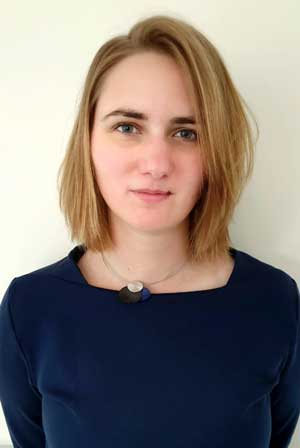 After 1945, interest in German history grew internationally as various scholars attempted to explain the country’s slide into dictatorship. Important impulses in this regard came from German-speaking Jewish historians, many of whom had emigrated to the USA.
After 1945, interest in German history grew internationally as various scholars attempted to explain the country’s slide into dictatorship. Important impulses in this regard came from German-speaking Jewish historians, many of whom had emigrated to the USA.
This project analyses how these historians (including a few women), as border crossers between American and (West) German scholarship, attempted after 1945 to (re-)interpret German history in the nineteenth and twentieth centuries. This endeavour went hand in hand with their engagements with their own personal fates, leading to their frequent stigmatisation as ‘biased’. The project therefore also investigates the reactions to their research in West Germany and the USA.
The analysis is based on the following case studies: George Hallgarten, Hans Rosenberg, and Hajo Holborn as representatives of social history-dominated aetiology; George Mosse, Fritz Stern, and Georg Iggers, who focussed on intellectual and cultural history analyses of the rise of National Socialism; Adolf Leschnitzer and Herbert A. Strauss as representatives of contemporary Jewish history; and Henry Friedlander, Raul Hilberg, Rita Steinhardt Botwinick, and Gerhard Weinberg as pioneers of Holocaust research. The project is based on their personal papers and works as well as discussions of their works.
Anna Corsten is a doctoral candidate in the Historical Seminar at Leipzig University and was a stipend recipient of the Gerda Hinkel Foundation from 2016 to 2019. She studied history and sociology at the Friedrich Schiller University in Jena and the University of Lausanne. In 2014 and 2015, she completed internships at the Leo Baeck Institutes in New York and London. In 2017, she was a Doctoral Fellow at the German Historical Institute in Washington D.C.
E-Mail: This email address is being protected from spambots. You need JavaScript enabled to view it.
Dagi Knellessen
Junior Fellow (10/2019–06/2020)
The Paradoxes of Bearing Witness. Jewish Survivors in the Federal German Sobibor Trials, 1949–1989
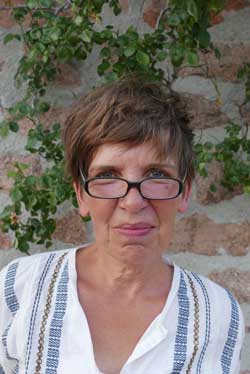 This long-term study systematically analyses the witness testimony of more than forty Jewish survivors of the Sobibor extermination camp given during the course of five Federal German trials between 1949 and 1989. The project reconstructs the origins, process, and concrete circumstances of the witness testimonies, with a particular focus on three aspects:
This long-term study systematically analyses the witness testimony of more than forty Jewish survivors of the Sobibor extermination camp given during the course of five Federal German trials between 1949 and 1989. The project reconstructs the origins, process, and concrete circumstances of the witness testimonies, with a particular focus on three aspects:
1) the initiatives, activities, and transnational relations of the survivors as well as their motives and strategies for testifying;
2) the worldwide participation of Jewish organisations such as the World Jewish Congress and individuals like Simon Wiesenthal; and
3) the demands and respective contemporary constitution of the Federal German judiciary context, the course of the respective trials, and the judicial evaluation of the credibility of these witnesses by the state prosecutors and judges.
The overall picture reveals that Sobibor survivors testified repeatedly over a period of four decades as witnesses in West German courts. Due to the special circumstances of the crimes, this placed them in a vulnerable and precarious position. They were moreover confronted by a judicial system that regarded them with ever increasing distrust and made increasingly paradoxical demands on them. In this special case, the development of a form of bearing witness becomes evident that clearly contradicts the general history of German perceptions of and engagements with the Holocaust after 1945.
Dagi Knellessen has been a doctoral candidate at the Leibniz Institute for Jewish History and Culture – Simon Dubnow in Leipzig since 2015. She completed a Magister in educational studies, political science, and psychology at the Technical University of Berlin in 2001. From 2001 to 2005, she was a research associate at the Fritz Bauer Institute in Frankfurt am Main, where she collaborated on the creation of an exhibition on the first Frankfurt Auschwitz trial. From 2005 to 2015, she worked as a freelance educational studies scholar in Berlin, contributing to research and educational projects on the history of the perception of and judicial reckoning with the Holocaust after 1945, on forms of bearing witness among victims of Nazi persecution and Jewish survivors, as well as in oral history projects, topics on which she has also published.
E-Mail: This email address is being protected from spambots. You need JavaScript enabled to view it.
Lovro Kralj
Junior Fellow (10/2019–08/2020)
Paving the Road to Death. Antisemitism in the Ustaša Movement 1929–1945
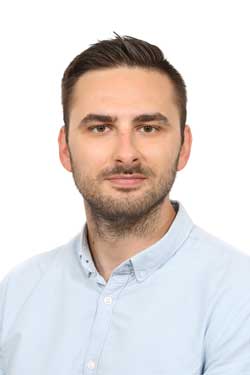 Lovro Kralj’s dissertation reinterprets the importance of antisemitism in the Ustaša movement. This dissertation challenges historiographical interpretations that reduce Ustaša antisemitism to a mere imitation of Nazism as well as arguments that the Ustaša only participated in the Holocaust because of German pressure or appeasement. Kralj’s main hypothesis, by contrast, is that antisemitism was adopted by the Ustaše as a key tool in the fascisation of the movement.
Lovro Kralj’s dissertation reinterprets the importance of antisemitism in the Ustaša movement. This dissertation challenges historiographical interpretations that reduce Ustaša antisemitism to a mere imitation of Nazism as well as arguments that the Ustaša only participated in the Holocaust because of German pressure or appeasement. Kralj’s main hypothesis, by contrast, is that antisemitism was adopted by the Ustaše as a key tool in the fascisation of the movement.
The interdependence of antisemitism and fascisation will be examined through a quantitative analysis of Croatian National Socialist, clerical, nationalist, and Ustaša media in the interwar period. The implementation of antisemitic policies in the Independent State of Croatia will be analysed through a comparison of the persecution of Jews in the cities of Križevci, Osijek, and Sarajevo. The case of Križevci undermines the purely top-down approaches to the interpretation of the Holocaust in Croatia, while the cases of Osijek and Sarajevo demonstrate the multifaceted functions of antisemitism in a multi-ethnic setting.
Lovro Kraljs specialises in the fields of fascism, antisemitism, and Holocaust studies, with a geographic focus on Central and South-Eastern Europe. He has participated in and presented at more than twenty international workshops and conferences including the Lessons & Legacies. He has received several fellowships including the Sharon Abramson Research Grant and Saul Kagan Fellowship in Advanced Shoah Study.
E-Mail: This email address is being protected from spambots. You need JavaScript enabled to view it.
Paula Oppermann
Junior Fellow (11/2019–07/2020)
Changing Circumstances, Stable Agenda. The Ideology and Actions of the Latvian Fascist Pērkonkrusts Party
 This project focusses on the fascist Pērkonkrusts (Thunder Cross) party, examining how the organisation developed its ultra-nationalist, antisemitic ideology during the 1930s and contributed to the collapse of Latvian civil society through its attacks on Jews. On the basis of these insights, it will examine the role of the Pērkonkrusts during the Second World War. Its members were involved on various levels in the German machinery of occupation and annihilation.
This project focusses on the fascist Pērkonkrusts (Thunder Cross) party, examining how the organisation developed its ultra-nationalist, antisemitic ideology during the 1930s and contributed to the collapse of Latvian civil society through its attacks on Jews. On the basis of these insights, it will examine the role of the Pērkonkrusts during the Second World War. Its members were involved on various levels in the German machinery of occupation and annihilation.
When the Germans banned the party in August 1941, some of its members established contact with the national resistance, while others remained in the service of the occupiers. After the war, however, above all those members who had emigrated to North America and Western Europe established an image of the Pērkonkrusts men as patriotic resistance fighters. This project questions their narrative and uncovers continuities in political convictions and activities from the 1930s through to the postwar period.
Paula Oppermann studied history, Baltic studies, and Holocaust and genocide studies in Greifswald and Uppsala. She then worked in the Wiener Library and the Topography of Terror Foundation. Since 2017, she has been a doctoral candidate at the University of Glasgow, where she is examining the history of the Latvian fascist Pērkonkrusts (Thunder Cross) party. In the course of her doctoral studies, she has been a fellow among other places at the Institute for Contemporary History in Munich and the Institute for Russian and Eurasian Studies at the University of Uppsala.
E-Mail: This email address is being protected from spambots. You need JavaScript enabled to view it.
Lindsay MacNeill
Junior Fellow (04/2016 - 08/2016)
Defining Subversion. Policing Politics in Austria 1918-1955
 This project examines the policing of politics in Austria from 1918 to 1955 under the successive democratic, authoritarian, Nazi, and Allied occupation governments. Lindsay MacNeill is especially interested in how Austrian police forces defined and policed subversion under these different ideological regimes. The policing of politics is often understood as something that uniquely reflects the political ideology of a given regime. MacNeill seeks to challenge this view by examining the ways in which certain continuities in police behaviours, beliefs, and assumptions existed across national borders and continued despite regime change.
This project examines the policing of politics in Austria from 1918 to 1955 under the successive democratic, authoritarian, Nazi, and Allied occupation governments. Lindsay MacNeill is especially interested in how Austrian police forces defined and policed subversion under these different ideological regimes. The policing of politics is often understood as something that uniquely reflects the political ideology of a given regime. MacNeill seeks to challenge this view by examining the ways in which certain continuities in police behaviours, beliefs, and assumptions existed across national borders and continued despite regime change.
Lindsay MacNeill is a History PhD candidate at American University in Washington, D.C. She received her B.A. in Spanish and History at the University of North Carolina-Chapel Hill in 2009 and her M.A. in Modern European History at American University in 2013. She has also worked as a research coordinator at the Levine Institute of Holocaust Education at the United States Holocaust Memorial Museum. Research interests: Nazi Germany, political policing, interwar Austria, Spanish Civil War.
E-Mail: This email address is being protected from spambots. You need JavaScript enabled to view it.
Tel.: +43-1-890 15 14-800






